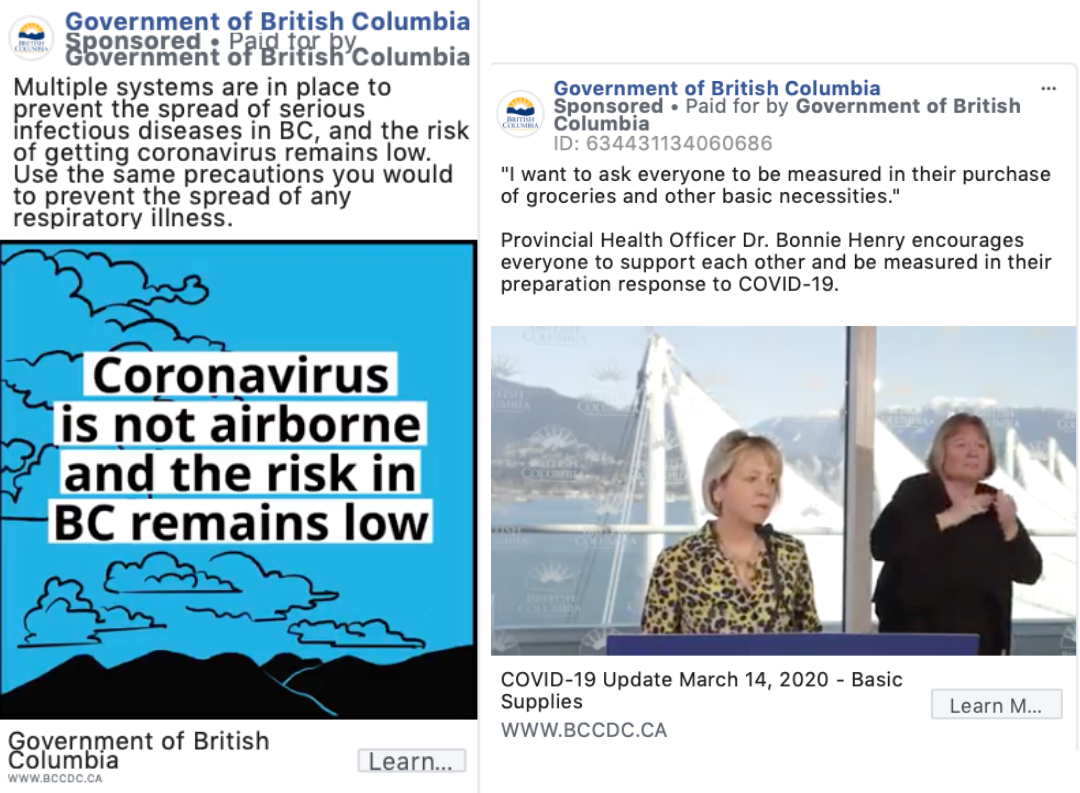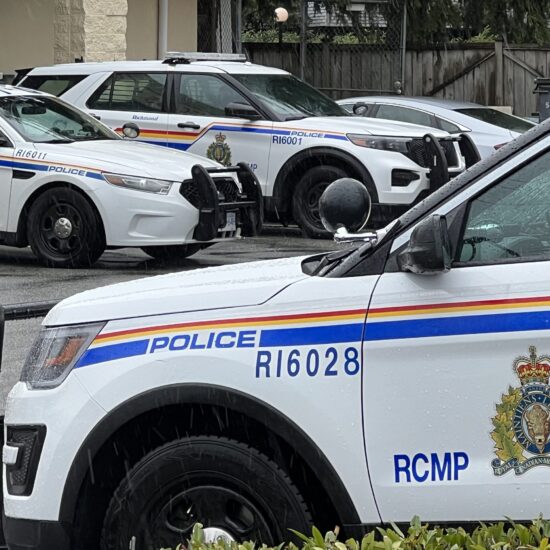
Bob Mackin
British Columbia’s NDP government has spent more than $271,000 on Facebook and Instagram ads since last June.
But it was rather slow to pivot to coronavirus prevention advertising.
On March 17, when Dr. Bonnie Henry declared a public health emergency, the government finally switched its Facebook posts to those only about the coronavirus pandemic.

Even with coronavirus spreading in B.C., there were few B.C. government ads until mid-March. (BC Gov/Facebook)
That was five days after the World Health Organization declared a global pandemic, 11 days after B.C.’s first coronavirus death and almost two months after the first joint statement by Henry and Health Minister Adrian Dix.
Before March 17, the B.C. government only interrupted its stream of NDP policy priority ads Feb. 6-8 to promote hand hygiene in English, Chinese and Punjabi, and March 13 to warn about high 8-1-1 call volumes.
According to an analysis by theBreaker.news of Facebook’s political Ad Library, the B.C. government ad placement strategy mirrored that of its TV plan for much of the first quarter of 2020, by promoting the child care program, WorkBC employment website, the 2020 budget and ICBC’s May 2021 no-fault insurance reform.
From June 2019 to April 26, 2020, taxpayers were charged $271,068, including $6,285 from April 12-18 and $6,188 from April 20-26. The seven most recent ads, since April 22, are in Chinese and Punjabi only, encouraging physical distancing and calling ahead to hospital if one exhibits coronavirus symptoms. The previous five ads were all in English and promoted regional virtual town hall meetings with health experts and members of the NDP, BC Liberal and Green caucuses.
The switch to coronavirus-specific ads began March 17, with a video clip of a March 14 news conference in which Henry said “I want to ask everyone to be measured in their purchase of groceries and other basic necessities.”

B.C. government Facebook ads from the first quarter of 2020. (BC Gov/Facebook)
The government spent $1,000 to $1,500 with the goal of 350,000 to 400,000 impressions of the March 17-21 ad. It was intended to counter the panic buying of toilet paper, canned soup and cleaning goods at grocery stores across the province.
As the virus spread from Wuhan, China to the rest of the world, the NDP government kept advertising non-health messages on Facebook.
From Jan. 29 to Feb. 9, there were two dozen WorkBC ads and another 23 during the Feb. 4-9 period.
The government ended 2019 and started 2020 with ads about the United Nations Declaration on the Rights of Indigenous Peoples and four versos of the child care TV ads.
Other ads in 2020’s first quarter included messages about cannabis edibles, the Erase anti-bullying campaign, and the phase-out of medical services plan fees.
At a March 6 news conference in Vancouver about the government’s pandemic preparedness, theBreaker.news asked Premier John Horgan why he had yet to redeploy B.C. government communications resources to focus on coronavirus prevention.
“I would argue those issues are not just important to me, but they’re important to the public, that’s why we’re advertising them,” Horgan said. “Certainly, public service announcements are part and parcel of the plan going forward and we will be working together as cabinet, with advice from the deputy ministers committee, on the appropriate time to make those public service announcements.”

From the government’s early April-launched coronavirus prevention campaign. (BC Gov/Facebook)
It was not until a month later that the government finally rolled-out the “COVID-19 in B.C.”-branded campaign that features TV, radio and social media ads.
Before coming to power, the NDP had campaigned on a platform promise in spring 2017 to follow Ontario’s lead and give the Auditor General power to reject government advertising that was deemed partisan.
As of April 28, there had been 2,035 cases of coronavirus confirmed in B.C., with 105 people dead.
Support theBreaker.news for as low as $2 a month on Patreon. Find out how. Click here.
- Looking for information on how to keep yourself and others healthy amid the coronavirus pandemic? Do you have symptoms? Click here for all you need to know, from HealthLinkBC.











